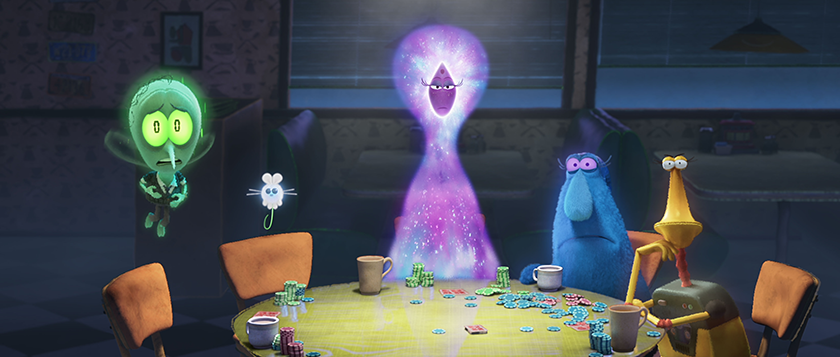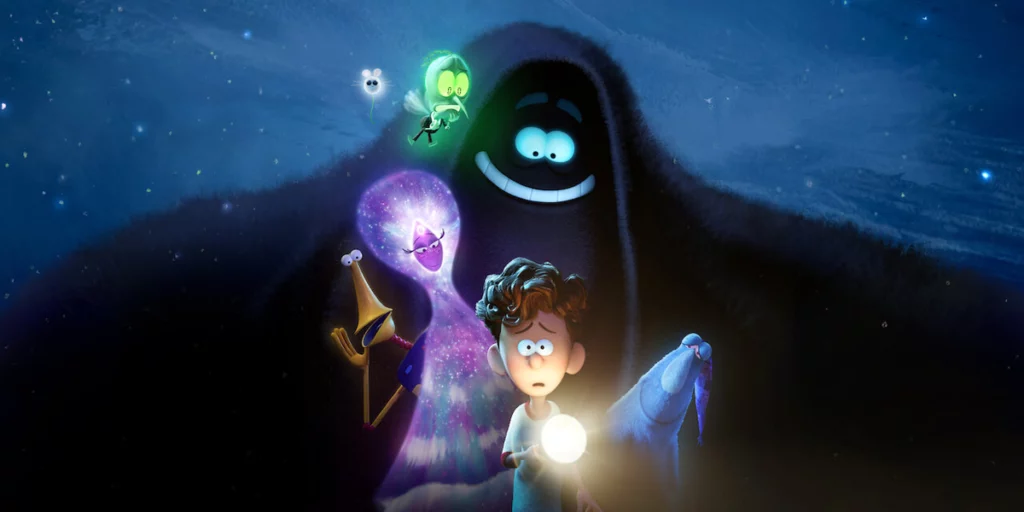With Orion and the Dark, Charlie Kaufman pens a thoughtful and honest script that unfortunately loses itself in the last act.
Charlie Kaufman is considered one of the best and most distinctive screenwriters working today. Kaufman always writes about himself and the worries he has in his life, such as loneliness and depression. And for his latest project, he decided to pen Orion and the Dark for director Sean Charmatz… a children’s animated feature for Netflix? It is definitely a weird choice when you consider the rest of his work: this one is a massive outlier in his repertoire. But one that draws immediate intrigue. While the film targets a younger audience, Kaufman still keeps his screenplay with his usual existential tone, although to a slighter degree.
Orion (Jacob Tremblay) is a kid who’s afraid of everything. He is scared of bees, rejection, giving incorrect answers in class, the school bully Richi Panichi, and plenty of other things that happen in his daily life. Fear has been eating his whole life, making him hide from everything life has thrown at him – including his crush, who asked him to sit with him on a field trip. Orion thinks the world is out to get him; that’s why he always prefers to stay by himself. His parents (Carla Gugino and Matt Dellapina) try to do everything they can to calm him down and confront his fears. But Orion is too panic-stricken and frantic to come close to facing the mental terrors.
Out of the many things Orion fears, the dark is the one that sends chills down his spine. Many of us can relate to what Orion experiences, as our household’s darkened corridors and corners had us running up the stairs to our rooms like scaredy cats. One night, Orion gets a surprise visitor who will turn his life around, Dark (Paul Walter Hauser) – the meta-physical embodiment of the night and darkness surrounding us. This night entity knows much about Orion’s fears, so he sees him as an annoyance. Like the ghosts of Christmas past, present, and future in ‘A Christmas Carol’, Dark decides to take the kid on a trip where he will learn that there’s nothing to be afraid of when it comes to darkness.
Dark introduces Orion to the other night entities, which will remind you of Pixar’s Inside Out: Sleep (Natasia Demetriou), Sweet Dreams (Angela Bassett, of Black Panther), Insomnia (Nat Faxon), and Unexplained Noises (Golda Rosheuvel). Their daily duties are helping people sleep well, or in some cases, even wake up in the middle of the night worried about a stressful situation.
Some time after their travels together, out of nowhere, the film cuts away from Orion and Dark’s adventure. It reveals that it is a bedtime story being told by the adult Orion (Colin Hanks) to his daughter Hypatia (Mia Akemi Brown). This storytelling trick immediately reminded me of Kaufman’s Adaptation screenplay, where he placed himself inside the film and talked about his struggles. (Coincidentally, the adult version of Orion also looks similar to him when younger.)

Charlie Kaufman does the same thing here. He puts himself in the story to discuss his childhood fears and how he overcame them. That’s one of the reasons why I love his work: he twists things in unexpected ways and hooks you in with personal notions and thoughts relatable to the viewer. When Hypatia thinks that her father is making the story too childish for its good, avoiding answers to tough questions or not explaining some of the pains that arise from fear, the story of Orion and the Dark shifts. What was once an easy children’s tale now becomes more complex.
It is pretty interesting that Charlie Kaufman has decided to make a kids’ movie, considering that the last project he made for Netflix, I’m Thinking of Ending Things, is a brilliantly morbose and depressing adaptation of Iain Reid’s acclaimed novel. I would have never expected to see him cross over to a more family-friendly territory. In this latest project, he takes Emma Yarlett’s children’s book and his twist on it. You can immediately sense him with each line being said, except for what transpires during the last (and quite dull) twenty minutes. The screenplay doesn’t contain the melancholy and dread that works of his like Synecdoche, New York and Anomalisa have. But some thematic layers are still reminiscent of them.
The American screenwriter and novelist has always written about love, identity, mortality, and fate in his projects, each time in a more ambitious way. Some of those aforementioned themes make their way into Orion and the Dark, giving it a personality of its own amidst the animated films being released yearly. He finds ways to put some of life’s frustrations, worries, and anxieties on a canvas that tethers between the recognizable and unrecognizable – the grounded and the surrealistic. In this case, Kaufman adds comedic elements so that we laugh at common fears while also attaching minor dashes of horror. He does this combination to make viewers, particularly children, believe they can overcome these things – not be afraid of everything and hide beneath the covers.
In some ways, you can compare Orion and the Dark to Beau is Afraid. The comparison doesn’t arise from the manic, darkly comedic tone with which Ari Aster constructs his film; of course, this is a kids’ movie, and the A24-backed project is anything of the sort. But it emerges due to the existentialist background within Charlie Kaufman’s screenplay, which includes some small easter eggs from his previous works (such as Adaptation and I’m Thinking of Ending Things). Both titular characters, Beau and Orion, are afraid of whatever you can imagine, whether it is bees or going outside. Everything is collapsing in the former’s world, literally and figuratively. In the latter, it is all happening in his mind.
The best films targeted at children tackle such themes to prepare them for the hardships of life. These types of films don’t get as much attention as those with more prominent stars attached or are handled by bigger production studios. And there is a possibility that this film might get lost amidst the vast amount of content on Netflix. But Kaufman deserves some flowers because he is one of the few screenwriters who wants to continue with this trajectory of thematically-hefty animated features. The problem with Orion and the Dark is that the last act feels too rushed to garner an effect on the viewer. Things get resolved quickly, and the resolution doesn’t feel like a proper one.
During that process, the film ends not only once but twice. It had two endings, and the second one seems entirely unnecessary. You are hooked right until the last twenty-five minutes. After that, it is a lost cause of two random, excessive side plots that the film doesn’t need. That wholly ruined Orion and the Dark for me because it felt like forced entry; it didn’t feel like it was part of what Kaufman was developing throughout the course of the film. Most people who are knowledgeable about Kaufman’s work and writing style will be intrigued to check Orion and the Dark out by his name alone. But even those who aren’t will be drawn by a relatable tale about facing your fears, at least until the last act, where it loses itself entirely.
Orion and the Dark is now available to watch on Netflix.

